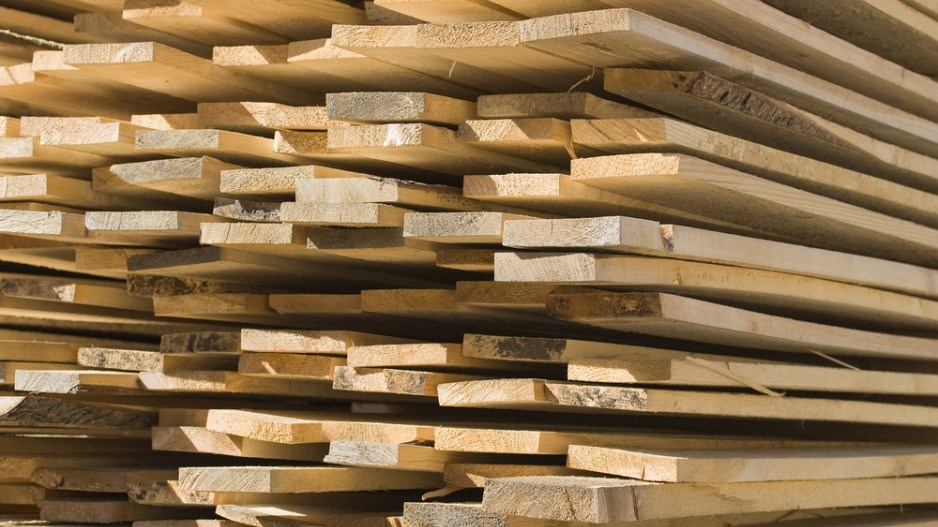Despite a 20% tariff on wood products shipped to the United States, the Canadian forest industry is still basking in the sunshine because of high lumber prices, Russ Taylor, president of International Wood Markets Group, said Thursday at the close of a day-long global lumber conference in Vancouver.
“The storm is coming, but we are still in the sunshine,” Taylor said in an interview summing up the generally positive attitude of lumber producers towards the U.S. market. The storm he was referring to is the future impact of a countervailing duty on softwood lumber products that went into effect May 1.
What’s behind the optimism is lumber price increases since February that have covered the cost of the duty. It’s already built into prices, so selling lumber into the growing U.S. housing market is still a lucrative business, said speakers at the conference, sponsored by International Wood Markets.
The storm will come when those high prices collapse. Lumber is a commodity subject to volatile price swings and what goes up, comes down, U.S. lumber producer Ahren Spilker, operations and export sales manager of the Idaho Forest Group, said in his remarks to the 260 people attending the conference. But until that happens, the duty has already begun to pay off for U.S. lumber companies.
“We have had a heck of a year. This last run [in prices] is one of the strongest we have ever seen,” Spilker said.
What was surprising about the comments from the North American producers is that they appear to be taking the lumber duties in stride. This is the fifth lumber war in the last 40 years, and producers on this side of the border have learned how to manage their trading relationship with the U.S.
Canadian companies subject to the duty said they are trying to limit their exposure to the U.S. Once final countervailing and anti-dumping duties are set in late fall, then B.C. mills will begin to accommodate. Whether that means shutdowns is not known, said Carl Dobler, general manager of export sales and marketing for Vancouver-based Interfor.
Quebec lumberman Christian Provost, vice-president of sales and marketing for Boscus Canada, said his company is not considering curtailments. Harvesting plans are already set, and once companies begin cutting timber for the season, they are in for the long run. Once timber is on the ground, the cost of shutting down mills is too high.
Taylor said the duty may be a bump in the road right now, but the lumber war is expected to be long and there will be casualties before it is over.
When prices fall, Canadian producers will feel it first, because of the additional cost duties impose. But even while prices are high, Canada is at risk of losing market share to offshore producers. Taylor said that during a recent trip to Europe, lumber producers there were peppering him with questions about the duty and its repercussions for them.
“They are looking around to see where they can go, and the U.S. market is starting to look pretty good,” Taylor said.
Americans may even find Russian wood has replaced Canadian lumber in their homes.
“We’ve seen Russians recently put lumber on ships so they can sell more into China. Now that they are putting stuff on ships instead of using rail, there’s actually a small amount of wood landing in North America,” Kevin Mason, managing director of ERA Forest Products Research, said in an interview.
And B.C.’s value-added lumber sector already sees problems with the U.S. duty. U.S. producers allege Canadian provinces subsidize the forest industry by setting the price for timber harvesting rights on Crown land.
The value-added sector, which takes lumber produced at sawmills and creates a higher-valued product from it, says it pays the market price at the mill, yet it has also been swept up in the net of U.S. duties.
Russ Cameron, president of the Independent Wood Processors Association, said value-added producers are generally small, family-owned businesses that buy their wood on the open market. They are now paying a price for lumber that already has the cost of the duty built into it, yet they will be charged duty once again when they ship their finished products across the border.
They are caught in the middle of the softwood dispute, Cameron said, adding that he fears many will go out of business. He said since the last lumber war, half the B.C. value-added producers have gone under. Duties, and the tax that was imposed as part of that settlement, added costs that made shipping to the U.S. too expensive.
“It was cheaper to ship from Vancouver to Shanghai than from Vancouver to Bellingham,” he said.




